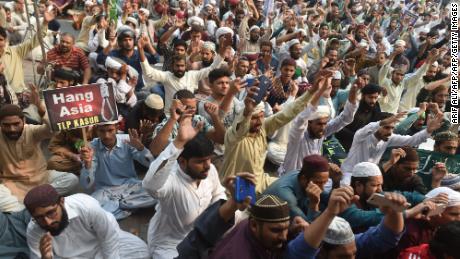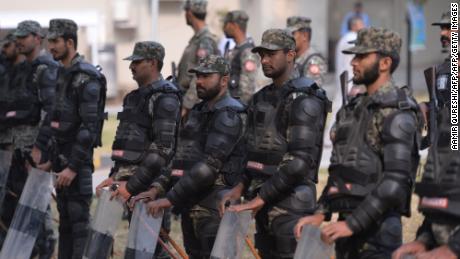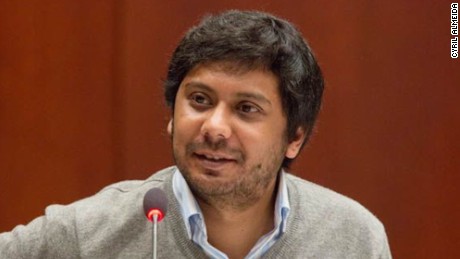Asia Bibi, a mother of five from Punjab province, was convicted of blasphemy in 2010 and sentenced to hang after she was accused of defiling the name of the Prophet Mohammed during an argument the year before with Muslim colleagues. The workers had refused to drink from a bucket of water Asia Bibi had touched because she was not Muslim. At the time, Asia Bibi said the case was a matter of women who didn't like her "taking revenge."She won her appeal against the conviction and subsequent death sentence on Wednesday.Islamist movement Tehreek-e Labbaik (TLP)had previously vowed to take to the streets if Asia Bibi was released, and protests broke out in Islamabad and Lahore soon after the ruling was announced.Within hours, the protests were large enough that government officials in the cities were urging people to stay inside and avoid adding to the chaos. Demonstrators blocked a motorway in Lahore and a road linking Islamabad and Rawalpindi has been closed off. Angry workers from the TLP have also staged sit-ins and chanted slogans against Pakistan officials and judges.In response, police officials invoked Section 144 of the Criminal Procedure Code, which prevents the gathering of more than four people.  The country's Prime Minister Imran Khan slammed the protests as a "disgusting response" to the top court's decision."You are not aiding Islam by talking about killing judges and by killing our generals who have sacrificed so much for our country," Khan said in defense of the verdicts. "I am appealing to our people: Do not get caught up by the worlds of these people who only want to increase their vote bank." In his statement, made Wednesday on Pakistani state-run TV, the PM warned the TLP to halt the protests. "This government will not stand aside and see property and livelihoods being destroyed. Do not force us to take action." In its ruling, the Supreme Court court quoted Shakespeare's "King Lear" in its ruling, saying Asia Bibi appeared to have been "more sinned against than sinning." "Even if there was some grain of truth in the allegations leveled in this case against the appellant still the glaring contradictions in the evidence of the prosecution highlighted above clearly show that the truth in this case had been mixed with a lot which was untrue," the ruling said. David Curry, CEO of Open Doors USA, an organization that lobbies on behalf of Christian minorities, said in a statement that "we are breathing a sigh of relief today." "These charges stemmed from her Christian identity as well as false accusations against her," he said. "We are hopeful that Pakistan will now take additional steps to offer religious freedom and basic human rights throughout the country."
The country's Prime Minister Imran Khan slammed the protests as a "disgusting response" to the top court's decision."You are not aiding Islam by talking about killing judges and by killing our generals who have sacrificed so much for our country," Khan said in defense of the verdicts. "I am appealing to our people: Do not get caught up by the worlds of these people who only want to increase their vote bank." In his statement, made Wednesday on Pakistani state-run TV, the PM warned the TLP to halt the protests. "This government will not stand aside and see property and livelihoods being destroyed. Do not force us to take action." In its ruling, the Supreme Court court quoted Shakespeare's "King Lear" in its ruling, saying Asia Bibi appeared to have been "more sinned against than sinning." "Even if there was some grain of truth in the allegations leveled in this case against the appellant still the glaring contradictions in the evidence of the prosecution highlighted above clearly show that the truth in this case had been mixed with a lot which was untrue," the ruling said. David Curry, CEO of Open Doors USA, an organization that lobbies on behalf of Christian minorities, said in a statement that "we are breathing a sigh of relief today." "These charges stemmed from her Christian identity as well as false accusations against her," he said. "We are hopeful that Pakistan will now take additional steps to offer religious freedom and basic human rights throughout the country."
Controversial law
Under the Pakistan penal code, the offense of blasphemy is punishable by death or life imprisonment. Widely criticized by international human rights groups, the law has been used disproportionately against minority religious groups in the country and to go after journalists critical of the Pakistani religious establishment. Her case has attracted widespread outrage and support from Christians worldwide, and condemnation from conservative Islamist groups in Pakistan, who have demanded the death penalty be carried out and threatened widespread protests in the event of her being freed.The case has been extremely divisive within Pakistani society, splitting liberals and conservatives and leaving even many supporters afraid to speak out on Asia Bibi's behalf. In 2011, senior politician Salman Taseer was shot dead by his own bodyguard for voicing support for Asia Bibi and condemning the country's stringent blasphemy laws. His killer, Mumtaz Qadri, immediately surrendered to police and was later executed, becoming a martyr for many hardline Islamists. At his funeral in 2016, thousands converged on the northern city of Rawalpindi as the Pakistani media was blacked out to prevent riots. Leaders of prominent Islamist political parties attended the funeral as supporters of Qadri carried signs in celebration of his "bravery." Qadri's grave, in the capital city of Islamabad, has since become a shrine for those supporting Asia Bibi's death sentence. 
Polarizing case
Amnesty International researcher Rabia Mehmood said that one of the reasons the Asia Bibi case has become so polarizing and controversial is the Pakistani government's failure to take "effective measures to curb the campaign of hate and violence incited by certain groups in the country following her conviction, in fact the state has shown immense tolerance for the narratives of hate." She previously highlighted a tweet by a media organization linked to TLP, which last year led to violent anti-blasphemy protests, warning the court to "think carefully before making any decision." In May this year, Pakistan's Interior Minister, Ahsan Iqbal, was shot and wounded in his shoulder in an incident police sources linked to the 2017 demonstrations. "We can only hope that (the Asia Bibi case) becomes a watershed moment when it comes to blasphemy laws in Pakistan," Mehmood said.  A verdict in Asia Bibi's favor, sends "out a message of hope and will be a step in addressing human rights abuses, religiously motivated discrimination and violence targeted at religious minorities and even Muslims who are accused of committing blasphemy."CNN understands that at least two Western countries have offered Asia Bibi asylum once she has been released. Such a move will likely be greeted by mass protests by Islamist groups, which could turn violent. It will also prove a key test for new Pakistani Prime Minister Imran Khan, who courted the country's religious right during his successful campaign and has voiced support for blasphemy laws. Khan should "take a stance against the intimidation of Tehreek-e-Labbaik, whose leaders have demanded that Khan fulfill his promises to make Pakistan an 'Islamic state'," Pakistani journalist Rafia Zakaria wrote for CNN last month. "Instead of snubbing the international community, one that Islamists see as impinging on Pakistan's move toward a full theocracy, Khan could emphasize the need to embrace it and to work with it. In other words, Khan could choose to stand with the innocent woman instead of the rabid and bloodthirsty extremists."
A verdict in Asia Bibi's favor, sends "out a message of hope and will be a step in addressing human rights abuses, religiously motivated discrimination and violence targeted at religious minorities and even Muslims who are accused of committing blasphemy."CNN understands that at least two Western countries have offered Asia Bibi asylum once she has been released. Such a move will likely be greeted by mass protests by Islamist groups, which could turn violent. It will also prove a key test for new Pakistani Prime Minister Imran Khan, who courted the country's religious right during his successful campaign and has voiced support for blasphemy laws. Khan should "take a stance against the intimidation of Tehreek-e-Labbaik, whose leaders have demanded that Khan fulfill his promises to make Pakistan an 'Islamic state'," Pakistani journalist Rafia Zakaria wrote for CNN last month. "Instead of snubbing the international community, one that Islamists see as impinging on Pakistan's move toward a full theocracy, Khan could emphasize the need to embrace it and to work with it. In other words, Khan could choose to stand with the innocent woman instead of the rabid and bloodthirsty extremists."
Religious battle
Outside of Pakistan, Asia Bibi's case has become a rallying call for many Christians, particularly Catholics. Catholic charity Aid to the Church in Need (ACN) led prayers for Asia Bibi's release last week in the UK, at a ceremony attended by her husband Ashiq Masih and daughter, Eisham Ashiq.  "We have prayed 10 years now for our sister, Asia, and I am confident that our prayers will be heard, and the judgment will go in favor of Asia, her family and the entire Pakistani Christian community," Father Emmanuel Yousaf said in a statement from the group. The family met with Pope Francis at the Vatican in February, during which the Catholic leader reportedly described Asia Bibi as a "martyr," according to ACN President Alessandro Mondeduro. Francis' predecessor, Pope Benedict, previously called for Asia Bibi's release. In her 2012 book "Get Me Out of Here," Asia Bibi included a letter to her family urging them not to "lose courage or faith in Jesus Christ."
"We have prayed 10 years now for our sister, Asia, and I am confident that our prayers will be heard, and the judgment will go in favor of Asia, her family and the entire Pakistani Christian community," Father Emmanuel Yousaf said in a statement from the group. The family met with Pope Francis at the Vatican in February, during which the Catholic leader reportedly described Asia Bibi as a "martyr," according to ACN President Alessandro Mondeduro. Francis' predecessor, Pope Benedict, previously called for Asia Bibi's release. In her 2012 book "Get Me Out of Here," Asia Bibi included a letter to her family urging them not to "lose courage or faith in Jesus Christ."
Sophia Saifi reported from Pakistan. James Griffiths reported from Hong Kong.
Original Article
[contf] [contfnew] 
CNN
[contfnewc] [contfnewc]







